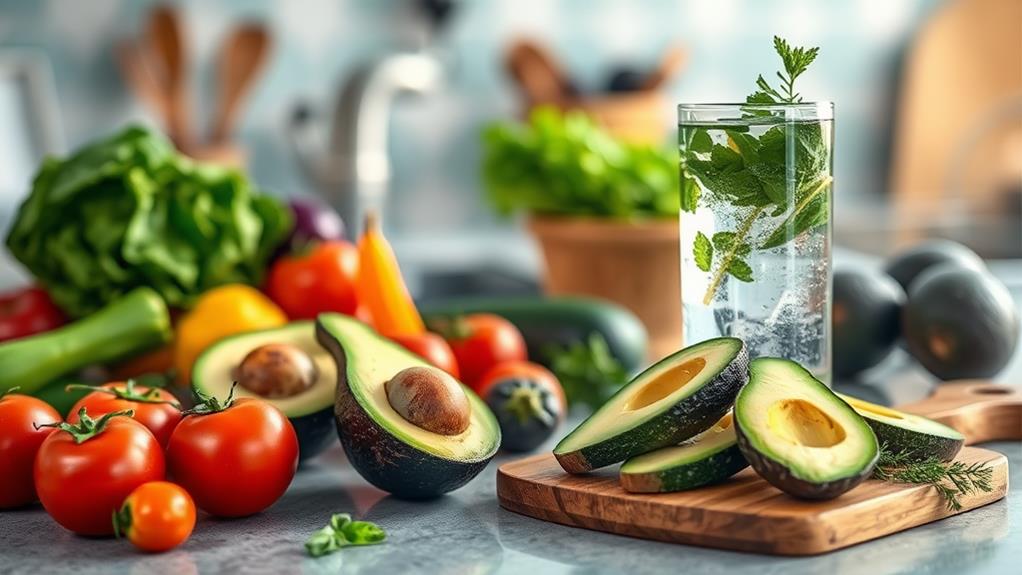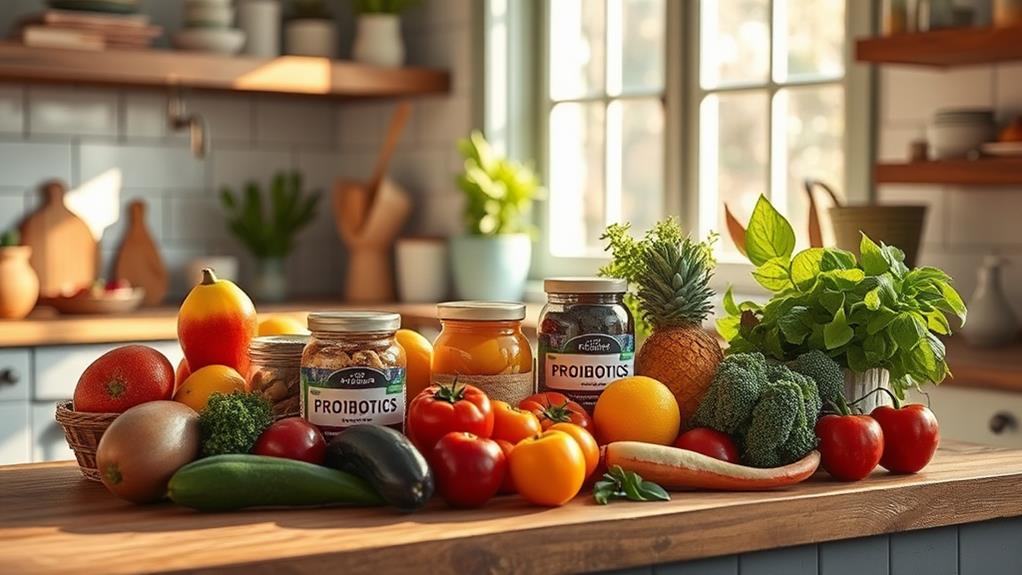If you’re looking to achieve a flat stomach without the sweat of exercise, it’s time to reflect on some practical lifestyle adjustments. You can start by focusing on your diet, hydration, and even your sleep patterns. Small changes, like incorporating more fruits and vegetables while cutting back on sugary snacks, can have a significant impact. Plus, mindful eating and managing stress play essential roles that you might not have taken into account. Curious about how these elements intertwine and what specific steps you can take? Let’s explore the details.
Key Takeaways
- Emphasize a diet rich in fruits, vegetables, and whole grains to reduce calorie intake and promote digestive health.
- Stay hydrated by drinking at least eight glasses of water daily to help control appetite and reduce bloating.
- Practice mindful eating by savoring food, eating slowly, and eliminating distractions to enhance satisfaction and prevent overeating.
- Prioritize quality sleep of 7 to 9 hours nightly to regulate hormones and manage stress, both linked to weight gain.
- Incorporate probiotics through yogurt or fermented foods to support gut health and potentially alleviate bloating.
Dietary Changes for a Flat Stomach

To achieve a flat stomach without hitting the gym, you need to focus on your diet. Start by eating plenty of fruits and vegetables. They’re low in calories and high in fiber, which helps keep you full. Try to fill half your plate with colorful veggies at each meal.
Next, choose whole grains instead of refined ones. Whole grains like brown rice and quinoa provide more nutrients and keep your energy steady throughout the day.
Don’t forget about protein! Lean meats, beans, and nuts can help you feel satisfied and less likely to snack on unhealthy foods. Also, cut back on sugary drinks and snacks. They add empty calories without any real benefits.
Lastly, pay attention to portion sizes. Sometimes, we eat more than we need, so try using smaller plates or bowls to help control your portions.
Importance of Hydration
Hydration plays an essential role in achieving a flat stomach, often overlooked in diet discussions. When you drink enough water, it helps your body digest food more effectively and can prevent bloating. You mightn’t realize it, but being well-hydrated can also help you feel full, making it easier to resist those tempting snacks.
Water flushes out toxins and keeps your metabolism running smoothly. If you’re not drinking enough, your body can hold onto extra water, making your stomach look puffier than it really is. So, aim to drink at least eight glasses of water each day. You can even add a slice of lemon or cucumber for a tasty twist!
It’s also a good idea to pay attention to how much water-rich food you eat. Fruits and veggies, like watermelon and cucumber, not only hydrate you but also provide essential nutrients.
Mindful Eating Practices

Staying hydrated sets the foundation for making healthier choices, and that’s where mindful eating practices come into play. Mindful eating is all about being aware of what you eat and how it makes you feel. When you sit down to eat, take a moment to notice the colors, smells, and textures of your food. This simple act can make your meals more enjoyable and satisfying.
Try to eat slowly, taking small bites and chewing thoroughly. This gives your brain time to register when you’re full, preventing overeating. You can also put away distractions, like your phone or TV, and focus on your meal. This helps you appreciate your food and recognize when you’ve had enough.
Listening to your body is essential, too. If you’re hungry, eat something healthy, but if you’re not, don’t feel pressured to snack just because it’s there.
Sleep and Stress Management
Quality sleep and effective stress management are essential if you want to achieve a flat stomach. When you don’t get enough sleep, your body produces more cortisol, a hormone that can lead to weight gain, especially around your belly. Aim for 7 to 9 hours of restful sleep each night.
Create a cozy sleep environment by keeping your room dark and cool. You might even want to establish a calming bedtime routine, like reading or listening to soothing music.
Managing stress is equally important. When you feel stressed, your body again releases cortisol, which can lead to those stubborn belly inches.
Try to find fun ways to reduce stress, like spending time with friends, enjoying a hobby, or practicing deep breathing exercises. Even a few minutes of mindfulness each day can help clear your mind and lower stress levels.
Incorporating Probiotics

A balanced gut can greatly impact your overall health and appearance, including your stomach area. One fun and effective way to support your gut is by incorporating probiotics into your daily routine. Probiotics are friendly bacteria that live in your gut and help keep everything running smoothly.
When your gut’s happy, you might notice less bloating and a flatter stomach!
You can find probiotics in foods like yogurt, kefir, sauerkraut, and kimchi. If you’re not a fan of these foods, don’t worry! Probiotic supplements can be an easy alternative. Just make sure to check the label for the right strains and potency.
To get started, try adding a serving of yogurt to your breakfast or snacking on some sauerkraut with lunch. You could even blend a smoothie with kefir for a tasty treat!
Remember to introduce probiotics gradually. This way, your gut can adjust without any discomfort.





